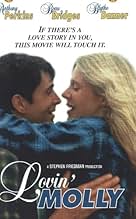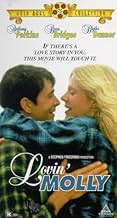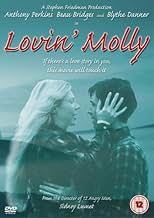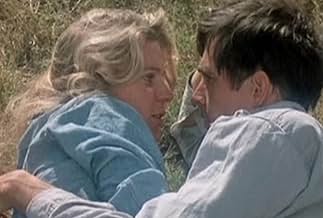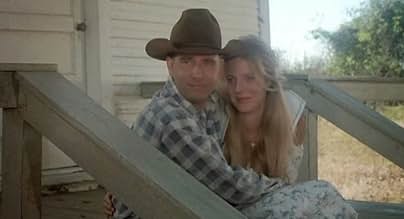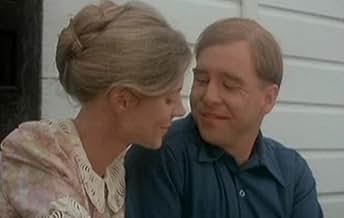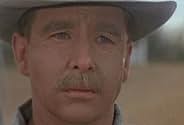Añade un argumento en tu idiomaSpanning nearly 40 years from 1925 to 1964, two Texas farm boys, straight-arrow Gid and laid-back Johnny, fight over the affections of the beautiful and headstrong Molly Taylor, who consiste... Leer todoSpanning nearly 40 years from 1925 to 1964, two Texas farm boys, straight-arrow Gid and laid-back Johnny, fight over the affections of the beautiful and headstrong Molly Taylor, who consistently refuses to marry either of them.Spanning nearly 40 years from 1925 to 1964, two Texas farm boys, straight-arrow Gid and laid-back Johnny, fight over the affections of the beautiful and headstrong Molly Taylor, who consistently refuses to marry either of them.
- Dirección
- Guión
- Reparto principal
Edward Binns
- Mr. Frye
- (as Ed Binns)
Marilyn Burns
- Sarah
- (sin acreditar)
- …
Richard Ray Lee
- Sheriff
- (sin acreditar)
Paul A. Partain
- Willy
- (sin acreditar)
Reseñas destacadas
In 1925 Texas, lanky farmer Anthony Perkins (as Gid Fry) and chubby chum Beau Bridges (as Johnny McCloud) both want to marry beautiful free-spirited Blythe Danner (as Molly Taylor). The trio crawl in and out of each other's beds for nearly forty years. If you don't believe this can get unexciting, just watch them from beginning to end. The three leads often seem intentionally made-up to look unattractive; however, Ms. Danner has a memorable nude scene in the early running...
You wouldn't know to look at it, but "Lovin' Molly" stemmed from a story by "The Last Picture Show" (1971) writer Larry McMurtry and was helmed by "Network" (1976) director Sidney Lumet. Dramatic television veteran Edward Binns plays Perkins' crotchety father. Watch for a couple of (then) daytime television stars in small, featured roles...
Future big-league actress and "Rocky Horror" participant Susan Sarandon plays Mr. Perkins' neglected other woman, and Conard Fowkes (as Eddie) is a third man involved with Danner. A "flashback" scene with Mr. Fowkes reveals he has more "chemistry" with Danner than either of her leading men. Those familiar with his "Dark Shadows" role as the New England lawyer who helped Victoria Winters find Laura Collins' coffin will realize Fowkes' is the film's outstanding performance.
**** Lovin' Molly (4/14/74) Sidney Lumet ~ Anthony Perkins, Beau Bridges, Blythe Danner, Conard Fowkes
You wouldn't know to look at it, but "Lovin' Molly" stemmed from a story by "The Last Picture Show" (1971) writer Larry McMurtry and was helmed by "Network" (1976) director Sidney Lumet. Dramatic television veteran Edward Binns plays Perkins' crotchety father. Watch for a couple of (then) daytime television stars in small, featured roles...
Future big-league actress and "Rocky Horror" participant Susan Sarandon plays Mr. Perkins' neglected other woman, and Conard Fowkes (as Eddie) is a third man involved with Danner. A "flashback" scene with Mr. Fowkes reveals he has more "chemistry" with Danner than either of her leading men. Those familiar with his "Dark Shadows" role as the New England lawyer who helped Victoria Winters find Laura Collins' coffin will realize Fowkes' is the film's outstanding performance.
**** Lovin' Molly (4/14/74) Sidney Lumet ~ Anthony Perkins, Beau Bridges, Blythe Danner, Conard Fowkes
Coming on the heels of The Last Picture Show, this Larry McMurtry adaptation must've sounded like a sure thing with the likes of Beau Bridges, Anthony Perkins, and Blythe Danner before the cameras and the great Sidney Lumet behind but ultimately this film is a case of too much too soon. This story, which resembles last year's The Hi-Lo Country, could've been much more interesting in the hands of others. Bridges and Danner give their acting chops a good exercise but it's a case of bringing on newcomers before their time while Perkins is just miscast period. Even Lumet shows he's in unfamiliar territory by shooting the outdoor sequences in a flat, TV movie fashion while keeping the performances more in tune with the melodramatic films of yesteryear instead of being true to the times in which the film was made. Imagine what Sam Peckinpah or Martin Ritt could've done with the material. Neither being completely horrible or forgivably worthwhile, Lovin' Molly will remain an interesting footnote in the careers of all involved.
Molly was probably a likable character, and I got the impression Blythe Danner was giving a good performance. But somehow this movie never registered with me. I did like the old-time music (Ralph Stanley wouldn't want me to call it bluegrass) and the big-band music used in one scene in the 1940s.
My biggest problem was that I could never remember which of the male characters were which (and apparently Molly had the same problem seeing as how she couldn't make up her mind which one to like), and even though I like Beau Bridges, I never saw any of the men as resembling him until the 1960s.
This was probably a good movie to those who like novels such as 'Wuthering Heights'.
My biggest problem was that I could never remember which of the male characters were which (and apparently Molly had the same problem seeing as how she couldn't make up her mind which one to like), and even though I like Beau Bridges, I never saw any of the men as resembling him until the 1960s.
This was probably a good movie to those who like novels such as 'Wuthering Heights'.
Based on the touching Larry McMurtry novel Leaving Cheyenne, this 1974 western romance is a gem. I loved it so much, I watched it twice in one week - an honor of mine reserved for very special movies. It's told in sections, like the novel, focusing on each of the three characters' perspectives. First is young Anthony Perkins. He's grown up working on the family farm and trying to be responsible and mature like his father. His best friend, Beau Bridges, is a cowboy. He doesn't want to settle down and own his own land someday; he just wants to be a hired hand and be free to go where the wind takes him. The two pals are extremely close, and their near brotherly relationship is the strongest in the story. Even when they both fall in love with the same girl, Blythe Danner, their friendship never wavers.
As the years pass, Blythe is forced to make a choice between the two. Her choice surprises everyone, and the rest of the film shows how they cope and move on with the rest of their lives. Romance and friendship are the leads of the story, but hard work, responsibility, consequences, and time are also given strong supporting roles. Lovin' Molly isn't just a movie; it feels like you're witnessing the characters' lives. They become so dear to your heart, you'll be anxious to get a copy of the novel to get to know them even better. I usually prefer the movie to the book, and even though McMurtry's words are full of poignancy, this adaptation is equally haunting. The characters are given faces and fleshed out extremely well. I've never seen Psycho, but even if Anthony Perkins has been ruined for you, you can still see him with fresh eyes in this role. Beau Bridges is lovable and puts a smile on your face with his playful attitude. And even Blythe Danner, whom I don't really like, is sufficiently careless to make her character believable.
Lovin' Molly is wonderful. Every time I watch it, the ending and final lines make me tear up. I highly recommend it. Released in a year when grandiose movies like The Great Gatsby, Chinatown, and Murder on the Orient Express overshadowed intimate films like this, it still makes an impression.
As the years pass, Blythe is forced to make a choice between the two. Her choice surprises everyone, and the rest of the film shows how they cope and move on with the rest of their lives. Romance and friendship are the leads of the story, but hard work, responsibility, consequences, and time are also given strong supporting roles. Lovin' Molly isn't just a movie; it feels like you're witnessing the characters' lives. They become so dear to your heart, you'll be anxious to get a copy of the novel to get to know them even better. I usually prefer the movie to the book, and even though McMurtry's words are full of poignancy, this adaptation is equally haunting. The characters are given faces and fleshed out extremely well. I've never seen Psycho, but even if Anthony Perkins has been ruined for you, you can still see him with fresh eyes in this role. Beau Bridges is lovable and puts a smile on your face with his playful attitude. And even Blythe Danner, whom I don't really like, is sufficiently careless to make her character believable.
Lovin' Molly is wonderful. Every time I watch it, the ending and final lines make me tear up. I highly recommend it. Released in a year when grandiose movies like The Great Gatsby, Chinatown, and Murder on the Orient Express overshadowed intimate films like this, it still makes an impression.
It's seems clear that Sidney Lumet was unfamiliar with the setting, the characters, the story...I mean, Gid is a cowboy wearing OVERALLS--Gid's NOT a farmer! He was afraid of Texas, and moved back east to New Jersey to shoot the remainder of the film--no wonder the film looks like a TV movie. It should have been directed by someone else, someone who understood the place, and written by a screenwriter who understood the characters and story, like McMurtry himself, perhaps??? Maybe someday it will be re-done, and done justly. It's a moving and complex story, one that deserves to be told in the affecting way it's written. Eastwood as director? It spans a 45-year period, and though challenging, with the appropriate writer and director and actors would make for a timeless, memorable film.
¿Sabías que...?
- CuriosidadesDuring a production lunch break, screenwriter Stephen J. Friedman spotted a hippie vagrant mooching from the food line, and threw him out. That hippie, Tobe Hooper, then wandered to Austin where he filmed La matanza de Texas (1974), and completed it before "Lovin' Molly" was even released.
- ConexionesReferenced in By Sidney Lumet (2015)
Selecciones populares
Inicia sesión para calificar y añadir a tu lista para recibir recomendaciones personalizadas
- How long is Lovin' Molly?Con tecnología de Alexa
Detalles
Contribuir a esta página
Sugerir un cambio o añadir el contenido que falta


